
One Hundred Men and a Girl is a 1937 American musical comedy film directed by Henry Koster and starring Deanna Durbin and the maestro Leopold Stokowski. Written by Charles Kenyon, Bruce Manning, and James Mulhauser from a story by Hanns Kräly, the film is about the daughter of a struggling musician who forms a symphony orchestra consisting of his unemployed friends. Through persistence, charm, and a few misunderstandings, they are able to get famed conductor Leopold Stokowski to lead them in a concert, which leads to a radio contract. One Hundred Men and a Girl was the first of two motion pictures featuring Leopold Stokowski, and is also one of the films for which Durbin is best remembered as an actress and a singer.
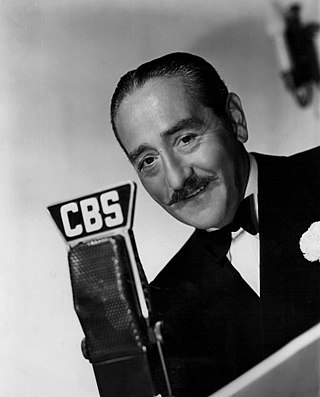
Adolphe Jean Menjou was an American actor. His career spanned both silent films and talkies. He appeared in such films as Charlie Chaplin's A Woman of Paris, where he played the lead role; Stanley Kubrick's Paths of Glory with Kirk Douglas; Ernst Lubitsch's The Marriage Circle; The Sheik with Rudolph Valentino; Morocco with Marlene Dietrich and Gary Cooper; and A Star Is Born with Janet Gaynor and Fredric March, and was nominated for an Academy Award for The Front Page in 1931.
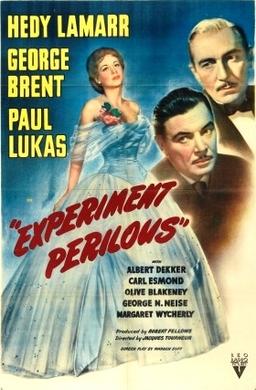
Experiment Perilous is a 1944 American melodrama film set at the turn of the 20th century. The film is based on a 1943 novel of the same name by Margaret Carpenter, and directed by Jacques Tourneur. Albert S. D'Agostino, Jack Okey, Darrell Silvera, and Claude E. Carpenter were nominated for an Academy Award for Best Art Direction-Interior Decoration, Black-and-White. Hedy Lamarr's singing voice was dubbed by Paula Raymond.
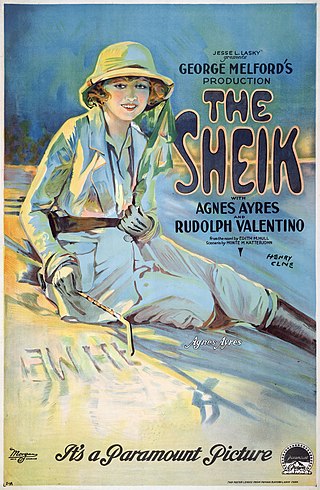
The Sheik is a 1921 American silent romantic drama film produced by Famous Players–Lasky, directed by George Melford, starring Rudolph Valentino and Agnes Ayres, and featuring Adolphe Menjou. It was based on the bestselling 1919 romance novel of the same name by Edith Maude Hull and was adapted for the screen by Monte M. Katterjohn. The film was a box-office hit and helped propel Valentino to stardom.

Carmel Myers was an American actress who achieved her greatest successes in silent film.
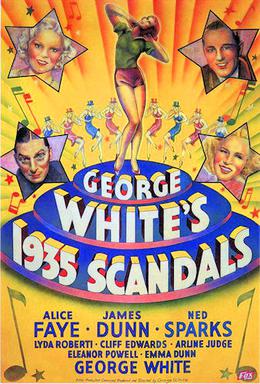
George White's 1935 Scandals is an American musical film, written by Jack Yellen and produced in 1935 by Fox Film Corporation. It was a follow-up to the 1934 release, George White's Scandals.

State of the Union is a 1948 American drama film directed by Frank Capra about a man's desire to run for the nomination as the Republican candidate for President, and the machinations of those around him. The New York Times described it as "a slick piece of screen satire...sharper in its knife-edged slicing at the hides of pachyderm schemers and connivers than was the original." The film was written by Myles Connolly and Anthony Veiller and was based on the 1945 Russel Crouse, Howard Lindsay Pulitzer Prize-winning play of the same name.

Convention City is a 1933 American pre-Code sex comedy film directed by Archie Mayo, and starring Joan Blondell, Guy Kibbee, Dick Powell, Mary Astor and Adolphe Menjou. The film was produced by Henry Blanke and First National Pictures and distributed by Warner Bros.

Roxie Hart is a 1942 American comedy film directed by William A. Wellman, and starring Ginger Rogers, Adolphe Menjou and George Montgomery. A film adaptation of a 1926 play Chicago by Maurine Dallas Watkins, a journalist who found inspiration in two real-life Chicago trials she had covered for the press. The play had been adapted once prior, in a 1927 silent film. In 1975, a hit stage musical premiered, and was once more adapted as the Oscar-winning 2002 musical film.
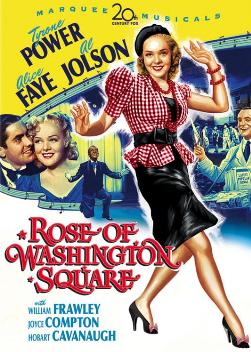
Rose of Washington Square is a 1939 American musical drama film, featuring the already well-known popular song with the same title. Set in 1920s New York City, the film focuses on singer Rose Sargent and her turbulent relationship with con artist Barton DeWitt Clinton, whose criminal activities threaten her professional success in the Ziegfeld Follies.

Every Night at Eight is a 1935 American comedy musical film starring George Raft and Alice Faye and made by Walter Wanger Productions Inc. and Paramount Pictures. It was directed by Raoul Walsh and produced by Walter Wanger from a screenplay by C. Graham Baker, Bert Hanlon and Gene Towne based on the story Three On a Mike by Stanley Garvey.

Pigskin Parade is a 1936 American musical comedy film which tells the story of husband-and-wife college football coaches who convince a backwoods player to play for their team so they can go to the big game. It was written by William M. Conselman, Mary Kelly, Nat Perrin, Arthur Sheekman, Harry Tugend and Jack Yellen, and was directed by David Butler.

On the Avenue is a 1937 American musical film directed by Roy Del Ruth and starring Dick Powell, Madeleine Carroll, Alice Faye, George Barbier, and The Ritz Brothers. Many of the songs were composed by Irving Berlin. Many of the plot details were used in Let's Make Love. Initially, the movie was called Out Front.

Wake Up and Live is a 1937 Fox musical film directed by Sidney Lanfield and starring Walter Winchell, Ben Bernie and Alice Faye. Produced by Darryl F. Zanuck, the film was based upon the self-help bestseller by Dorothea Brande. It was followed by Love and Hisses (1937).
The Housekeeper's Daughter is a 1939 comedy/drama film directed and produced by Hal Roach. The film stars Joan Bennett, Adolphe Menjou and John Hubbard. The screenplay was written by Rian James, Gordon Douglas, Jack Jevne and Claude Martin, based on a novel by Donald Henderson Clarke.
Hollywood Without Make-Up is a 1963 American film produced by Ken Murray and directed by Rudy Behlmer, Loring d'Usseau and Ken Murray (uncredited).
Broadway Gondolier (1935) is a musical film directed by Lloyd Bacon. The film was released by Warner Bros., and featured Dick Powell, Joan Blondell and Adolphe Menjou.

Broadway Through a Keyhole, also billed as Broadway Thru a Keyhole, is a 1933 American pre-Code musical film produced by Twentieth Century Pictures and released by United Artists.

Cafe Metropole is a 1937 American romantic comedy film directed by Edward H. Griffith and starring Loretta Young, Tyrone Power and Adolphe Menjou. It was produced and distributed by 20th Century Fox. The screenplay was based on an original story by Gregory Ratoff who also appears in the film. It is part of the tradition of screwball comedies which was at their height during the decade. It was commercially successful on its release.

George White's Scandals is a 1934 American pre-Code musical film directed by George White and written by Jack Yellen. The film stars Rudy Vallée, Jimmy Durante, Alice Faye, Adrienne Ames, Gregory Ratoff, Cliff Edwards and Dixie Dunbar. The film was released on March 16, 1934, by Fox Film Corporation. George White also produced George White's Scandals for RKO in 1945. It was directed by Felix E. Feist and starred Joan Davis and Jack Haley.
















